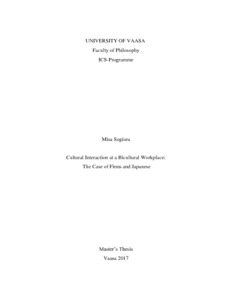Cultural Interaction at a Bicultural Workplace: The Case of Finns and Japanese
Sugiura, Misa (2017)
Kuvaus
Opinnäytetyö kokotekstinä PDF-muodossa.
Tiivistelmä
Due to internationalization, global relationships have become established in a number of fields of business, education, politics, and culture. The association between Finland and Japan is no exception and in fact, it is expected to continue to develop further. Yet, in reality, as internationalization has grown too rapidly, intercultural workplaces encounter a variety of challenges and confusion as a consequence of the cultural diversity of employees. Hence, this study aims to identify how cultural diversity affects the intercultural workplace.
In this thesis, a qualitative case study method was chosen in order to analyze employees’ experiences at a Finnish-Japanese bicultural workplace. Drawing on existing research literature, three cultural differences, namely 1. individualism/collectivism, 2. direct/indirect communication and 3. equal/hierarchical relationships, are discussed, as those differences seem to affect workplace interaction. As organization policy also can influence the workplace culture, the policy of the company studied is analyzed as well.
As the study demonstrates, previous research does not adequately reflect the experience of the participants of this study, five Finns and five Japanese who work together at the same bicultural workplace. In order to capture their experience, they were interviewed applying a semi-structured method, and the interviews were analyzed using categorical-content analysis. The results indicate that generalization of culture is merely impossible, yet cultural knowledge still has an important effect on the intercultural workplace.
Finally, the analysis shows how cultural insights cause a range of impacts on the work environment. Since cultural differences or characteristics exist to an extent and certain impacts are recognized as cultural conflicts, as a final point, possible implications or solutions are indicated, in order to improve or prevent such issues.
In this thesis, a qualitative case study method was chosen in order to analyze employees’ experiences at a Finnish-Japanese bicultural workplace. Drawing on existing research literature, three cultural differences, namely 1. individualism/collectivism, 2. direct/indirect communication and 3. equal/hierarchical relationships, are discussed, as those differences seem to affect workplace interaction. As organization policy also can influence the workplace culture, the policy of the company studied is analyzed as well.
As the study demonstrates, previous research does not adequately reflect the experience of the participants of this study, five Finns and five Japanese who work together at the same bicultural workplace. In order to capture their experience, they were interviewed applying a semi-structured method, and the interviews were analyzed using categorical-content analysis. The results indicate that generalization of culture is merely impossible, yet cultural knowledge still has an important effect on the intercultural workplace.
Finally, the analysis shows how cultural insights cause a range of impacts on the work environment. Since cultural differences or characteristics exist to an extent and certain impacts are recognized as cultural conflicts, as a final point, possible implications or solutions are indicated, in order to improve or prevent such issues.
